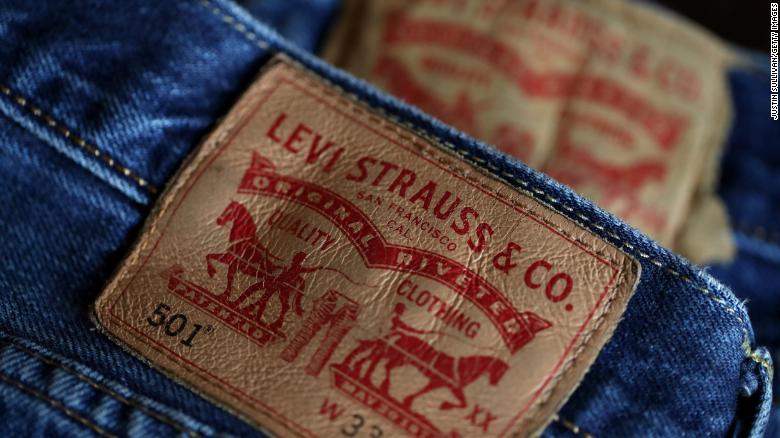(单词翻译:单击)
中英文本
Books & arts
来源于《图书与艺术》版块
Jean history
牛仔的历史
How American denim conquered the world
美国牛仔是如何征服世界的
He was born in a Bavarian village in 1829, fleeing anti-Semitism with his family at 17. From New York he caught a steamer to California, a newly minted American citizen, with a view to expanding the family’s dry-goods business. But these were the heady days of the Gold Rush, and the young man dreamed of making it big. His initiative paid off so well that you may be wearing his invention now: his name was Levi Strauss.
他于1829年出生在巴伐利亚的一个村庄,17岁时随家人逃离了反犹太主义。他在纽约搭上一艘汽船,前往新加入美国国籍的加州,目的是扩大家族的干货生意。但那是淘金热的日子,这个年轻人梦想着把它做大。他的倡议得到了很好的回报,你现在可能正穿着他的发明:他的名字是李维·斯特劳斯。

Technically, the entrepreneur who went by “Uncle Levi” didn’t invent the copper rivets on denim “waist overalls” that became his firm’s stock-in-trade. The idea came from a tailor in Nevada who bought cloth from Strauss to make work clothes for labourers. In 1872 Jacob Davis persuaded him to jointly file for a patent for an “improvement in fastening pocket openings”, and to shift from selling fabric to finished trousers. The rest is a history of marketing genius— documented in the largest-ever public display of artefacts from the Levi Strauss & Co. archive.
从技术上讲,这位被称为“李维大叔”的企业家并没有发明牛仔“腰部工作服”上的铜铆钉,而这种铆钉正是利瓦伊公司的存货。这个想法来自内华达州的一个裁缝,他从施特劳斯那里买了布给工人做工作服。1872年,雅各布·戴维斯说服他联合申请了一项专利,以“提升口袋开口紧固性”,并从销售布料转向销售成品裤子。剩下的就是营销天才的历史了——李维·斯特劳斯公司有史以来最大规模的文物公开展览记录了这段历史。
“Levi Strauss: A History of American Style” at the Contemporary Jewish Museum in San Francisco deftly weaves together corporate, cultural and social trends to tell the story of one of the country’s most famous exports. When Strauss died in 1902 he was eulogised as one of San Francisco’s foremost philanthropists and a pillar of the Jewish community. Nobody could have anticipated that the firm he bequeathed to four nephews would define America’s style and become a global juggernaut. It did that by cannily roping its product to two mythic American figures: the cowboy and the rebel.
旧金山当代犹太博物馆的《李维·斯特劳斯:美国风格的历史》巧妙地将企业、文化和社会趋势编织在一起,讲述了这个国家最著名的出口商品之一的故事。施特劳斯于1902年逝世,他被誉为旧金山最重要的慈善家之一和犹太社区的支柱。没有人能预料到他留给四个侄子的公司会定义美国的风格并成为全球巨头。李维斯公司做到了,通过巧妙地将自己的产品与两个美国神话人物——牛仔和反叛者——联系在一起。
Levi’s 501jeans were tough. The oldest pair on display dates to 1890; another was used to tow a car. Marketed originally to farmers, mechanics and miners, they became the garb of choice for Western horsemen. It wasn’t long before John Wayne and Clark Gable were wearing them into the sunset, followed by glamorous hoodlums played by Marlon Brando and James Dean.
李维斯的501牛仔裤很结实。展出的最古老的一条牛仔裤腿可追溯到1890年;另一条腿当时用来拖汽车。牛仔衣物最初的目标客户是农民、机械师和矿工,后来成为了西方骑兵的首选服装。没过多久,著名美国演员约翰·韦恩和克拉克·盖博就穿着牛仔看日落了,接着是马龙·白兰度和詹姆斯·迪恩扮演的迷人的流氓。
The brand’s advertising rode the countercultural wave, capitalising on its status as a badge of coolness and freedom. Marilyn Monroe wore Levi’s; Andy Warhol immortalised them. Even Albert Einstein was spotted in a Levi’s bomber jacket. Jeans that graced the haunches of the famous—including Patti Smith, Madonna and Beyoncé—fill the gallery and span the decades.
该品牌的广告乘着反文化浪潮,利用其酷和自由象征的地位象征。玛丽莲·梦露穿过李维斯;安迪·沃霍尔使其成为经典。甚至有人看到阿尔伯特·爱因斯坦穿着李维斯的短夹克。很多名人都穿过李维斯的牛仔裤——包括帕蒂·史密斯、麦当娜和碧昂丝——这些牛仔裤摆满了画廊跨越了几十年的而时间跨度。
At any given moment a big chunk of humanity is wearing blue jeans, the show’s curators observe. Levi’s have been coveted behind the Iron Curtain and fetishised in Japan; they have been ripped, embroidered and covered in ink. Not too shabby for a kid from Bavaria.
展览的策展人发现,在任何时候,都有一大块人穿着蓝色牛仔裤。李维斯在铁幕后备受关注,在日本也受到追捧;牛仔裤做成破洞、绣上花、还被墨水覆盖。对于一个来自巴伐利亚州的孩子来说,这不算太寒酸。
译文由可可原创,仅供学习交流使用,未经许可请勿转载。
词语解释
1. Juggernaut 难以监控的强大机构(或集团)
The group became a sales juggernaut in the commodity options business.
这个集团已经成为一个商品期权交易的销售巨头。
2. Iron Curtain 铁幕; 指将苏联和东欧共产党国家与西欧分开的边界
3. capitalize on 利用
The rebels seem to be trying to capitalize on the public's discontent with the government.
反叛者们似乎正试图利用公众对政府的不满情绪。


